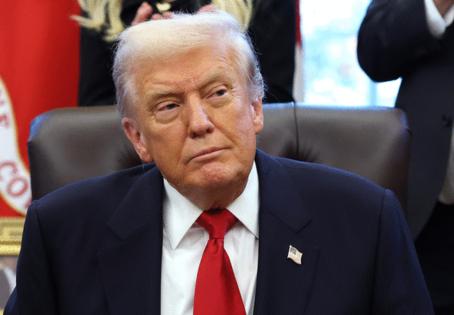Trump's $2,000 tariff 'dividend' marks throwback to COVID checks
Published in News & Features
WASHINGTON — President Donald Trump’s idea of mailing $2,000 “dividend” payments from tariffs to U.S. citizens marks a throwback to the stimulus checks distributed during the COVID crisis, with similar economic risks.
After floating the idea of tariff dividend payouts for months, Trump on Sunday offered the specific amount of “at least $2,000 a person.” He said the recipients wouldn’t include high-income individuals, without specifying a threshold.
While the president has repeatedly touted the billions raised in tariff revenue this year, such a plan — which would likely require congressional approval — could cost the U.S. government double what it’s projected to take in for 2025, one estimate shows. It would also undercut Trump’s argument that such revenue will be used to help start paying down federal debt — a claim economists say is unlikely anytime soon, with the government running near-$2 trillion budget deficits.
Back in December 2020, Trump was pressing U.S. lawmakers to amp up pandemic-aid checks to $2,000 from the $600 that they went on to approve. His successor Joe Biden made up the $1,400 gap in his American Rescue Plan in March 2021.
Some economists now blame excess federal payouts for contributing to the 2021-22 inflation surge — the worst since the early 1980s. More than four years on, consumer-price increases still haven’t returned to pre-COVID levels, raising the risk that a fresh wave of cash-drops into U.S. households stokes inflation again.
‘Deeply irresponsible’
Trump hasn’t specified how the mechanics of a $2,000 payout would work, or whether he’s seeking legislation to approve the “dividends,” though National Economic Council Director Kevin Hassett said on Fox News Monday that indeed Congress would need to approve the payout.
“It’s a terrible idea,” Paul Krugman, the Nobel laureate in economics, said on Bloomberg Television Monday. “The idea that, hey, we’re going to take one source of revenue and use it to hand out money when we’re meanwhile going ever-deeper into federal debt — that’s deeply irresponsible.”
The Committee for a Responsible Federal Budget, a centrist watchdog group, totted up a preliminary calculation of a $600 billion cost for the proposal, if the dividends were designed along COVID-payment lines. Net U.S. tariff revenue for the fiscal year through September totaled $195 billion, while many economists have penciled in around $300 billion for calendar-year 2025.
Another complication: The Supreme Court is weighing the legality of Trump’s import duties imposed using the International Emergency Economic Powers Act (IEEPA). If those go on to be invalidated, it would take seven years before the government raised enough tariff revenue to cover the full cost of the dividend checks, the CRFB said in an email Monday.
Bessent’s framing
Treasury Secretary Scott Bessent suggested on ABC’s This Week that the $2,000 might not be a check at all, but rather could be thought of as tariff-funded tax relief embedded in Trump’s signature tax legislation enacted in July.
“It could be just the tax decreases that we are seeing on the president’s agenda — no tax on tips, no tax on overtime, no tax on Social Security – deductibility on auto loans,” Bessent said.
In other words, no net new “dividend” payout, though Bessent also said he hadn’t spoken with Trump about the matter.
On Monday, Trump again posted on the payout idea on Truth Social, saying that the tariff revenue money “left over from the $2,000 payments” would be used to “substantially pay down national debt.”
For now, the record influx of customs revenue is going towards limiting fiscal deficits. It would take a shift to outright surpluses for federal debt to be reduced in nominal terms. The government last saw an annual surplus more than two decades ago, and deficits now are, by contrast, historically wide.
Should the Supreme Court rule that Trump’s IEEPA-invoked tariffs are unlawful and order refund payments, that could also see federal borrowing needs increase for a time as that process unfolds.
“If it was illegally collected, there is supposed to be a remedy for that,” said Lawrence Friedman, customs and export controls partner at Barnes, Richardson & Colburn, LLP.
The administration hasn’t suggested its remedy could be to offer payouts to individual American citizens.
_____
With assistance from Laura Curtis, Hadriana Lowenkron and Katie Greifeld.
_____
©2025 Bloomberg L.P. Visit bloomberg.com. Distributed by Tribune Content Agency, LLC.







Comments